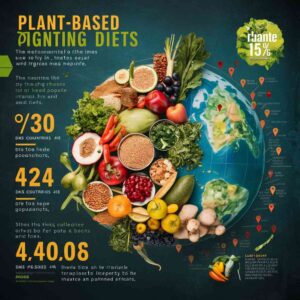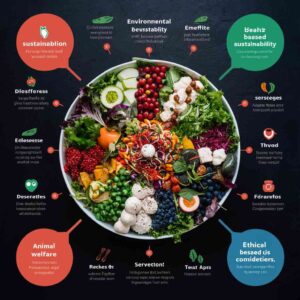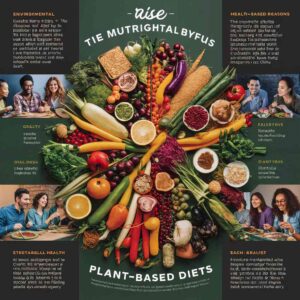Overview
It’s easy to understand why plant-based diets are becoming more and more popular these days. The main components of a plant-based diet are fruits, vegetables, grains, legumes, nuts, and seeds. People are joining this movement for a variety of reasons, including financial gains, environmental preservation, ethical considerations, and health advantages. Let’s examine the reasons behind the growing popularity of plant-based diets.

Plant-Based Diets’ Health Benefits





Impact on the Environment
To protect the environment, plant-based diets are becoming increasingly popular. Changing our diets is a great approach to help our planet, which could use a little love.
Reduced Carbon Footprint: Compared to diets strong in meat, plant-based diets usually have a substantially reduced carbon footprint. Requires less water, land, and energy while growing plants.
Conserving Water Resources: Did you realize that a lot of water is needed to produce meat? You can cut your water consumption dramatically by eating more plants.
Decrease in Deforestation: Deforestation occurs mostly to create space for cattle and their feed. Diets high in plants require less land, which protects forests.
Reduction of Pollution: Raising animals produces a lot of waste and greenhouse gases, which contribute to pollution. Increasing plant-based diet can help mitigate these negative consequences.

Moral Aspects to Take into Account
Concerns about ethics are yet another major factor in the decision to adopt a plant-based diet. Many people desire to make more compassionate decisions because they find the treatment of animals in industrial farming to be uncomfortable.
Animal Welfare: It is alarming to see the conditions under which a large number of animals are bred and killed. By following a plant-based diet, you abstain from these behaviors.
Sustainable farming and fair labor methods are two more ethical factors to take into account when sourcing products. It’s not only about the animals. Plant-based diets frequently place a strong emphasis on obtaining food that is produced sustainably and responsibly.
Cruelty-Free Lifestyle: Eating a plant-based diet is a great way to lead a cruelty-free lifestyle for people who wish to lessen harm in all facets of their lives.
Financial Aspects
Plant-based diets are becoming more and more popular for economic reasons as well. Plant-based diets are becoming more widely available and reasonably priced as demand increases.
Plant-Based Foods’ Cost-Effectiveness: A lot of staple plant-based foods, such as rice, lentils, beans, and seasonal vegetables, are less expensive than meat and dairy products, making them a budget-friendly choice.
Employment Creation in Plant-Based Industries: The economy is being stimulated by the plant-based sector’s growth, which is generating new jobs in retail, food production, and agriculture.
Market expansion and investment opportunities: The rapidly growing plant-based industry is drawing significant capital, which is fueling the development of new goods and technologies.
Cultural Transitions
The popularity of plant-based diets is also being fueled by cultural influences. Social media, celebrity endorsements, and growing public knowledge of healthy eating all have a significant impact.
Influence of Social Media and Celebrities: People are greatly influenced by celebrities and influencers who support plant-based diets. Plant-based recipes, success stories, and instructional resources abound on social media.
Growing Knowledge and Education: Through community initiatives, educational institutions, and medical professionals, more individuals are becoming aware of the advantages of adopting a plant-based diet.
Changes in the Food business and Availability: In response to consumer demand, the food business is offering a wider range of plant-based goods. There are now more plant-based options available in supermarkets and restaurants than ever before.

Scientific Investigations and Progress
The advantages of plant-based diets have been demonstrated by science, and new technologies are making these diets more enticing and attainable.
Research Endorsing Plant-Based Diets: A large body of research demonstrates the health advantages of plant-based diets, such as lowered risk of chronic illnesses and enhanced general health.
Technological Developments in Food Production: Better plant-based goods are being produced as a result of advancements in food technology. Technology is making it simpler to enjoy a plant-based diet without sacrificing taste or diversity, from meat alternatives to dairy-free cheeses.
Better Taste and Variety of Plant-Based Options: A wide range of palates can be satisfied by the tasty and varied plant-based options available today.
Popular Diets Based on Plants
Plant-based diets come in a variety of forms, each with unique advantages and methods.
Veganism: This diet forgoes dairy and eggs, among all other animal products. It emphasizes entire plant foods and is frequently driven by moral, ecological, and medical considerations.
Meat avoidance: Vegetarians may eat dairy products and eggs, but they do not eat meat. This diet is adaptable and can be customized to meet dietary requirements and personal preferences.
Flexitarianism: This diet philosophy emphasizes plant-based foods with the occasional inclusion of meat and animal products. This diet is flexible and an excellent approach to start eating more plant-based foods.
Plant-Based, Whole-Food Diet: This diet places a strong emphasis on unprocessed, whole plants. It stays away from processed foods, oils, and refined sweets in favor of natural, nutrient-dense meals.
Obstacles and Remarks
Plant-based diets have drawbacks and critics despite their many advantages.
Nutrient Deficiencies: A concern for some people is obtaining adequate amounts of protein, iron, B12, and other nutrients. These demands can be satisfied with careful planning and possibly supplements.
Accessibility and Affordability: Specialty items can be pricey, but many plant-based foods are reasonably priced. In areas with little options or in food deserts, accessibility may also be a problem.
Misconceptions and Resistance: There is a misperception that diets based solely on plants are monotonous, challenging, or drastic. Food customs from families and cultures can sometimes be a source of resistance.
Advice for Making the Switch to a Plant-Based Diet
The following advice can help you make a smooth transition to a plant-based diet:
Start Slowly and Gradually: Increase the amount of plant-based meals in your diet little by little at first. This can facilitate your body’s adjustment and lessen the sense of overwhelm during the shift.
Include a Variety of Foods: To ensure that your diet meets all of your nutritional demands, make sure it contains a wide selection of fruits, vegetables, grains, nuts, and seeds.
Locate Plant-Based Substitutes: Almost all animal products have plant-based substitutes available. Try a variety of brands and varieties to determine which are your favorites.
Continue to Learn: Continue to broaden your knowledge of plant-based diet. Books, movies, and online courses are a few examples of resources that might offer insightful knowledge and inspiration.
Testimonials and Success Stories
Learning about the experiences of others can be really inspiring.
Celebrities and Influences: Millions of followers have been inspired by the great experiences of numerous celebrities, including as Zac Efron and Beyoncé, who have openly discussed their plant-based diet success.
Individuals from the Everyday World: Testimonials from common individuals who have overcome health concerns, reduced weight, or improved their health through plant-based diets can be quite uplifting.
Health Transformations: After converting to a plant-based diet, many have reported experiencing notable health gains, including lower cholesterol, improved blood pressure, and more energy.
Visit our Store
Recipes and Suggestions for Dinner
The abundance of delectable foods available to you when following a plant-based diet is one of its delights.
Options for Breakfast: Oatmeal with fresh fruit, avocado toast, chia seed pudding, and smoothie bowls are all excellent ways to start the day.
Ideas for Lunch and Dinner: Try plant-based burgers, veggie stir-fries, grain bowls, and substantial salads. There are countless options.
Snacks and Desserts: Indulge in dairy-free ice cream, fruit and nut bars, and hummus and veggie sticks. Plant-based sweets like chocolate avocado mousse will satisfy your sweet taste.
Supplements and Support for Nutrition
With a plant-based diet, supplements can help make sure you get all the nutrients you need.
Essential Minerals and Vitamins: It’s critical to keep an eye on calcium, iron, vitamin B12, and omega-3 fatty acids. Any shortfalls can be filled with supplements.
Suggested Supplements: A balanced diet can be supported by taking a good multivitamin, a B12 supplement, and possibly a DHA/EPA omega-3 supplement.
Dietary Balance with Supplements: Although food should always be the primary source of nutrients, supplements can offer an additional layer of protection.

Prospects for Plant-Based Dietary Trends
Plant-based diets appear to have a bright and exciting future.
Emerging Plant-Based Products: New and enhanced plant-based products are constantly being introduced to the market thanks to innovations. The possibilities are growing, ranging from dairy-free cheeses to meats created in labs.
Forecasts for Market Growth: Consumer demand for more sustainable and healthful food options is likely to fuel the plant-based market’s continued rapid growth.
Potential Issues and Their Solutions: Issues like price, accessibility, and false information will always exist, but they can be resolved with the support of advocacy, education, and ongoing innovation.
In summary
The growing popularity of plant-based diets is a complex issue influenced by economic, ethical, environmental, and health reasons. This trend is probably going to keep expanding as more individuals come to appreciate the benefits and delights of eating a plant-based diet. There’s never been a better moment to investigate a plant-based lifestyle, whether your motivations are health, sustainability, ethics, or just plain curiosity.
FAQs

The main components of a plant-based diet are fruits, vegetables, nuts, seeds, oils, whole grains, legumes, and beans. It can range in rigor from being strictly vegan to occasionally include animal products.

Not always. Many plant-based staples such as rice, beans, lentils, and seasonal vegetables are fairly inexpensive, while other specialty goods can be highly expensive.

Indeed, plant-based diets include whole grains, beans, lentils, tofu, tempeh, nuts, and seeds can supply an adequate amount of protein. To make sure you get all the important amino acids in your diet, variety is key.

Increase the amount of plant-based meals in your diet gradually at first. Try out new recipes, look for plant-based alternatives for your favorite meals, and learn about the nutritional benefits of a plant-based diet.

Some common misunderstandings about plant-based diets are that they are difficult to follow, monotonous, or inadequate in nutrients. In actuality, plant-based diets may be tasty, nourishing, and simple to stick to with the right preparation and a variety of foods.


Leave a Reply